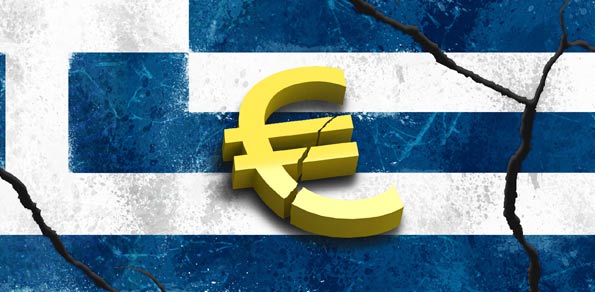There appears to be an element within the press that wants to over egg this pudding for all it’s worth, can they simply not let go of the potential for drama? Search as hard as you can there doesn’t appear to have been any recorded systemic change between the optimism of an overall deal on Friday and ‘non events’ over the weekend.
Private debt holders appeared to have accepted that a circa 70%+ haircut is the only way forward combined with an interest rate (long term) of circa 3.5%…so why the dramatic claims in the media? The Greece problem looks to all intents and proposes (bar the micro detail) solved, let’s collectively begin to look for the next big issues shall we? The USA, the UK..?
The euro approached its strongest level in more than two weeks versus the dollar before European officials meet to push ahead with plans to tackle the region’s debt crisis. The 17-nation currency erased declines versus the dollar and the yen as European stocks advanced. It earlier weakened on concern that Greece will struggle to reach an agreement with creditors to ease its debt burden.
The euro was less than 0.1 percent higher at $1.2940 at 8:32 a.m. London time, after erasing a 0.6 percent drop. It reached $1.2986 on Jan. 20, the highest level since Jan. 4. The euro was also little changed at 99.69 yen.
Has the ECB become the bank of last resort?
European banks may borrow as much next month from the European Central Bank as they did in the record offering in December as they seek refuge from frozen funding markets.
The ECB lent banks an unprecedented 489 billion euros for three years in December. Analysts expect demand to be as high at a second auction on Feb. 29, the stigma associated with using the facility has disappeared whilst the list of what assets can be used as collateral in exchange for the loans will be extended. ECB President Mario Draghi said last week he expects demand for loans next month to be very high but lower than in December.
The ECB is flooding the banking system with cheap money in a bid to avert a credit crunch after the market for unsecured bank debt seized up and funding from U.S. money markets dries up. Politicians, including French President Nicolas Sarkozy, are pushing the banks to use the loans, which carry an interest rate of 1 percent, to buy higher-yielding southern European sovereign debt, thereby forcing down borrowing costs in the region.
The ECB is offering banks unlimited cash as lenders try to refinance more than $765 billion of debt that matures this year, just as institutional investors remain reluctant to buy debt from all but the safest banks. Lenders in Italy, Spain and France are using the loans to purchase more of their domestic government debt to profit from the difference between the interest rate on the ECB money and the higher yield on sovereign securities, analysts said.
Demand from more than 500 lenders in December dwarfed the 293 billion-euro estimate of economists surveyed. Half of the loans were taken up by Italian and Spanish lenders.
Italian banks were the main users, with UniCredit SpA, the country’s largest lender, taking 12.5 billion euros, Intesa Sanpaolo SpA, the second-biggest, accepting 12 billion euros, and Banca Monte dei Paschi Di Siena SpA 10 billion euros. Spokesmen for the three banks declined to comment.
Market Overview
Spain has released GDP figures for the fourth quarter and 2011. Its economy shrank by 0.3% between October and December from the previous quarter (following zero growth in the third quarter), and grew by 0.7% over the year as a whole. The Bank of Spain also estimates that the economy will contract by 1.5% this year, and return to meagre growth of 0.2% in 2013.
Reuters is reporting that EU ambassadors have agreed to impose an embargo on Iranian oil imports, but postponed full implementation of the ban until 1 July. The news agency cited a senior EU diplomat. The EU’s 27 foreign ministers, who are meeting in Brussels today, still have to formally approve the ban. EU governments will have to stop signing new contracts with Tehran as soon as the ban is in place, but will be able to fulfil existing contracts until 1st July.
Activity in the earlier Asian session was subdued due to the Lunar New Year holiday which closed markets in China, Hong Kong, Singapore and South Korea.
The broader MSCI world equity index was barely changed. Equity markets have been gaining on rising hopes that a slowdown in the global economy would not be as bad as many had feared after signs of solid economic growth in the U.S. where several big corporations, including IBM and Intel, have released strong earnings figures.
Market snapshot at 10:00am GMT (UK time)
The Nikkei closed down 0.01% as other main Asian bourses were closed due to the Chinese new year. The Australian index the ASX 200 closed down 0.34%. European bourse indices are ‘enjoying’ mixed fortunes in the early part of the morning session. The STOXX 50 is down 0.16%, the UK FTSE is up 0.25%, the CAC is down 0.05%, the DAX is down 0.60% and the MIB is up 0.41%. Brent crude is up $0.51 a barrel Comex gold is priced up $9 an ounce. The SPX equity index future is currently down 0.32%.
There is no economic calendar data, scheduled for release this afternoon, that is expected to significantly affect sentiment.





